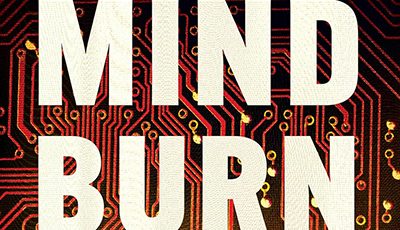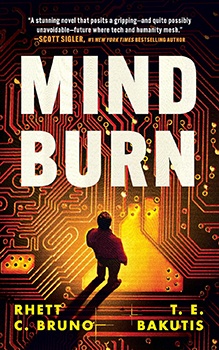

Latest Books Mind Burn with Rhett C. Bruno and T. E. Bakutis
The Big Thrill Discusses MIND BURN With Rhett C. Bruno and T. E. Bakutis
 When hackers can tap directly into the mind, you can’t trust anyone—even yourself.
When hackers can tap directly into the mind, you can’t trust anyone—even yourself.
It’s understandable to be nervous when your new employer tasks you with investigating the first successful mass shooting in twelve years.
Fortunately, detective-in-training Cowan Soto has a Personal Brain Assistant—a cybernetic implant—that allows him to firewall pesky emotions like worry and guilt and redact memories of bullet-riddled corpses.
Unfortunately, Cowan soon learns it was his suspect’s PBA which allowed a ruthless hacker to puppet her into a shooting rampage.
Aided by a veteran investigator, a brilliant CFO, a nihilistic cybercriminal, and the best waifu madam in Kearny Mesa, Cowan must wade through a gauntlet of homicidal professional gamers, the Russian mafia, and the board of OneWorld to bring this ruthless puppetmaster to justice.
All the while, the brand new detective is concealing the fact that he’s the exact type of criminal OneWorld has hired him to arrest: a loose circuit—a human unbound by behavioral modification protocols.
Authors Rhett C. Bruno and T. E. Bakutis recently sat down with The Big Thrill to discuss their latest mystery, MIND BURN.
What do you hope readers will take away from this book?
I’d be happy if, after readers finish MIND BURN and all the cards are on the table, they find themselves questioning who in the story was right and who was wrong. I try never to write any story where any one character has all the answers and is always in the right. Even the more ruthless characters in MIND BURN can have good motives, while even the well-meaning characters can do less than honorable things.
As someone who came of age before the Internet existed and has witnessed its effect on our society as social media becomes more prevalent and more toxic, I’m fascinated with how people choose to use technology and how much it differs from how the creators of that technology expected people to use it. I doubt the people who created online streaming or hard-to-trace Voice Over IP services suspected that empathy-free teenagers would use them to “swat” live streamers in hopes someone would get shot.
I don’t have any idea how we can moderate or prevent the misuse of the constantly evolving technology that is rapidly changing everything about our lives. I just want people to keep thinking about it. And ultimately, I hope readers will consider how they might behave in the world I present in this book.
Was there anything new you discovered, or surprised you, as you wrote this book?
I was shocked by how much of what I initially wrote as science fiction became science fact in the time between when I started writing MIND BURN and when it was published (over five years). Personal Brain Assistants (PBAs) were a scifi dream until Neuralink pitched the idea of actual brain implants. Virtual Intelligences or VIs (or, more accurately, language learning models) started as a cool idea for AI that wasn’t quite AI and then went mainstream with Chat GPT. Even self-driving cars took big strides.
As someone who considers himself tech savvy and someone who keeps up with new developments in science and tech, I of course use published articles to inspire and inform my writing. I was just surprised by how quickly the ideas I read about or came across became as real as in my book. I hope the Sim becomes real one day. It would be amazing. But I suspect it will cause as many problems as the Internet.
No spoilers, but what can you tell us about your book that we won’t find in the jacket copy or the PR material?
Many of the scenes that take place in the Sim (a future version of the Matrix that people with PBAs can experience in a way that feels like real life) were drawn from my own experiences in both flatscreen videogames and later VR, including Second Life, Quake 3, and VRChat. While the technology in the Sim is obviously vastly more advanced than what we have today, the way people use that technology to interact is how I’ve observed people using multiplayer games and VR tech today. Socializing. Competitive gaming. Talented artists building fantastic virtual worlds for people to explore.
I feel like how I’ve seen people interact in the virtual worlds I’ve grown up exploring with others provides clear evidence that even once humans have easy access to a Matrix-like world, what we enjoy doing there will be similar to what we enjoy doing now. We’ll just be more free to do it due to lack of consequences. This is both good (freeing us to express ourselves without fear) and bad (unleashing our inner troll and lowering our empathy for real people we encounter in any virtual environment).
What attracts you to this book’s genre?
I’ve loved playing videogames since the moment I got my Atari 2600, and as a game designer in my day job, I naturally enjoy a story where it’s possible to actually step into a game world (as in MIND BURN) and walk around inside it. Current VR technology already provides something approximating this experience (I’ve walked around in so many mind blowing and jaw-dropping environments in VRChat) but the Sim—the virtual world people in MIND BURN can visit through their PBAs—feels as real as real life.
For me, being able to step into a world we can shape to our whims is an incredibly exciting idea. Cyberpunk is one of the few sub-genres of science fiction that I feel really explores and fleshes out the idea of how being able to enter and live in entirely virtual worlds changes society, people, and social interactions. So like the idea of being able to travel into and tell stories in persistent virtual worlds.
What’s the one question you wish someone would ask you about this book, or your work in general? And, please answer the question too!
The question I’d like people to ask after reading MIND BURN would be “After reading this book, would you install a PBA?” And since I’m asking that question, I’ll answer it for myself.
Despite all the problems PBAs are shown to cause in my book, my answer is yes. I would accept one. PBAs are, as seen in the book, essentially a social contract a large portion of the population makes, not out of altruism, but out of self-interest. They offer consequence free pleasure and peaceful co-existence.
Yes, PBAs are also vulnerable to external manipulation, and they can also leave you vulnerable if you come into contact with one of the small number of people who refuse the technology. Those who can commit violence. I didn’t want to make PBAs perfect because no technology is perfect. Every time the people who construct a new technology invent it, someone finds a way to hack it. It’s an endless cycle.
Personal computers are regularly afflicted with viruses and ransomware, but we still use them. Cellular phones can be implanted with keyloggers that store our passwords or track our location without our knowledge, and we still use them. Even innocuous devices like GPS-enabled luggage tags can be slipped into your car to stalk you without your knowledge using off the shelf technology available to anyone.
In the end, I look at all technology and balance how it benefits me against the dangers it poses. Yes, my PBA could get hacked and it could cause problems, but having a PBA would also allow me to eat only healthy food that tastes like succulent chocolate or bacon, enjoy thrilling experiences like flying or playing videogames that feel as real as real life, and even help cure depression or help me easily go to sleep at night. The quality of my life is as important as the quantity, so I would consider a PBA worth it.
My question is… would you?
Rhett C. Bruno is a USA Today, Washington Post, and #1 Audible bestselling author, and has been nominated for a Nebula Award. He is the author of the Children of Titan series, the Buried Goddess Saga, the Circuit Trilogy, The Roach, and the Audible Original The Luna Missile Crisis, among others. His story, Interview for the End of the World, was nominated for a 2019 Nebula Award. Rhett left his day job in 2018 and used his experience as both a traditionally and self-published author to found Aethon Books. Rhett also founded Sci-Fi & Fantasy Bridge, a newsletter service which holds a list of thirty thousand dedicated sci-fi and fantasy readers.
T. E. Bakutis is an author, game designer, and a lifelong fan of sci-fi, fantasy, and video games, who now produces content for all three. His series of snarky sci-fi thrillers, the Insurgency Saga, received warm reviews in Analog Science Fiction & Fact, and his Final Fantasy meets XCOM series, the Hallowed War, enjoys a strong following. He’s also won several awards for his short fiction. You can read more of his work, including more stories set in the universe of Mind Burn and his other published titles, here.
To learn more about the authors, please visit their website.
MIND BURN with Rhett C. Bruno and T. E. Bakutis
- Deadly Revenge by Patricia Bradley - November 21, 2024
- Unforgotten by Shelley Shepard Gray - November 21, 2024
- The Big Thrill Recommends: THE BOYFRIEND by Freida McFadden - October 29, 2024
